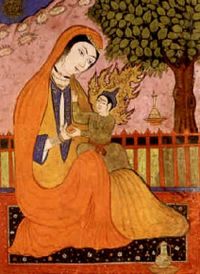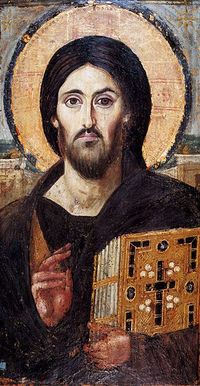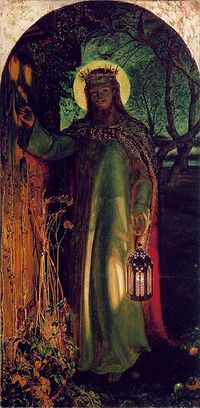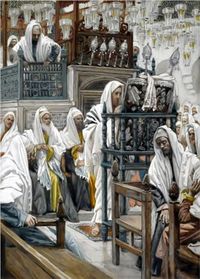2020 Jesus course
1 Tue Sep 1, 2020 - Introduction: The Diversity of Second Temple Judaism. Models of relation between Judaism and Christianity.
2 Thu Sep 3, 2020 - Problem (1): The Origin of Evil (I)
- Tue Sep 8, 2020 - Problem (1): The Origin of Evil (II)
- Thu Sep 10, 2020 - Reading sessions
- The Fallen Angels and the Flood in Genesis and Enoch
- The Fall of Adam in Genesis, Philo and Enoch
- Tue Sep 15, 2020 - The Christian and the Rabbinic Answers (1)
- The Original Sin
- The yetzer hara
- Thu Sep 17, 2020 - Problem (2): The Messiah and the Word to Come (I)
- Tue Sep 22, 2020 - Problem (2): The Messiah and the Word to Come (II)
- Thu Sep 24, 2020 - Reading sessions
- Tue Sep 29, 2020 - The Christian and the Rabbinic Answers (2)
- Jesus as the divine Messiah
- The Son of David
- Thu Oct 1, 2020 - The Problem (3): The Torah and Its Interpretation. The canon (I)
- Tue Oct 6, 2020 - The Problem (3): The Torah and Its Interpretation. The canon (I)
- Thu Oct 8, 2020 - Reading sessions
- Tue Oct 13, 2020 - The Christian and the Rabbinic Answers (3)
- The Allegorical Meaning
- The Centrality and Preexistence of the Torah
- Thu Oct 15, 2020 - Exam (?)
- Tue Oct 20, 2020 - Problem (4): The Temple and the Priesthood
- Thu Oct 22, 2020 - Reading sessions
- Tue Oct 27, 2020 - The Christian and the Rabbinic Answers
- Jesus as the Heavenly High Priest
- Israel as a people of priests
- Thu Oct 29, 2020 - Problem (5): Jews and non-Jews
- < Election Day / No class / Tue Nov 3, 2020 >
- Thu Nov 5, 2020 - Reading sessions
- Tue Nov 10, 2020 - Answer
- Christianity as a "universalistic/exclusive" religion
- Rabbinic Judaism as a "particularist/inclusive" religion
- < Thu Nov 12, 2020 - International Seminar on the Gospel of Matthew >
- Tue Nov 17, 2020 - Unsolved Problems: Women, Slaves
- Thu Nov 19, 2020 - Reading sessions [with Joshua Scott]
- < Thanksgiving Recess / No classes / Nov 24-26, 2020 >
- Tue Dec 1, 2020 - Oral presentations (10 min each)
- Thu Dec 3, 2020 - Oral presentations (10 min each)
- Tue Dec 8, 2020 - Oral presentations (10 min each)
- Thu Dec 10, 2020 - Oral presentations (10 min each)





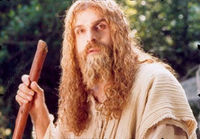

Historical Jesus, in Christianity, Judaism and Islam is a course offered by Gabriele Boccaccini at the University of Michigan in the Fall 2019.
Overview
The course focuses on the Jewish religious leader and messianic claimant, and founder of the Christian movement, Jesus of Nazareth (Jesus son of Joseph, Joshua bar-Yosef, Isa), as an historical character. By examining all extant historical sources (Jewish, Christian, and Islamic), the course offers a critical reconstruction of the major stages of the life and deeds of the prophet from Nazareth, from his birth under Herod the Great to his death and crucifixion under Pontius Pilate, within the diverse world of Second Temple Judaism. In particular, the course explores the ever-changing interpretation of Jesus in modern and contemporary Christianity, Judaism and Islam, to the present. The format of the course consists of two lectures per week by the instructor and a weekly discussion session conducted by a GSI. The course grade will be based upon daily assignments and attendance; two midterms, a paper and a final exam.
Lectures: M W 2:30-4pm
Office: 4145 Thayer, Department of Near Eastern Studies
e-mail: gbocca@umich.edu; tel 763.1595; fax 936.2679
Office Hours: W 4-5:30pm (office), or by appointment
History
Gabriele Boccaccini is Professor of Second Temple Judaism and Christian Origins at the University of Michigan since the Fall 1992. He has been offering courses on Jesus & the Gospels since the mid-1990s.
Syllabus (Fall 2019)
[Note: The syllabus may be subjected to some minor changes]
PART 1 - Ancient Christian, Jewish and Islamic sources on Jesus
<1> Tue Sep 1, 2020:
-- Jesus in Christianity (I): An Overview (Paul & the synoptic tradition, The gospels of Thomas and John, the NT Apocrypha).
- See Paul of Tarsus -- Gospel of Mark -- Q Gospel -- Gospel of Matthew -- Gospel of Luke -- Gospel of John -- Gospel of Thomas -- NT Apocrypha
- Read the Gospel of Mark
<2> Thu Sep 3, 2020:
-- Jesus in "Secular" History: Shared facts and (not-shared) beliefs. News and Fake News. Do we have any evidence from Jesus himself or from 1st century historians?
<3> Tue Sep 8, 2020:
-- Jesus in Judaism: An Overview. Main sources: A Teacher, a Martyr
Flavius Josephus, Gamaliel, the Talmud, the Toledot Jeshu up to Yaqub al-Qirqisani and Maimonides.
- See Jesus of Nazareth (sources)
- See Jesus in Judaism
- Read Ancient Jewish Sources on Jesus
<4> Thu Sep 10, 2020:
-- Jesus in Islam: An Overview: the Qur'an & the Gospel of Barnabas
- See Jesus in Islam
- See "Inside Islam", National Geographical Documentary
- See Gospel of Barnabas
- See Mesih (2007 Talebzadeh), film; YouTube
<5> Wed Sept 18, 2019:
-- The Historical Jesus: History of Research: (I) from Reimarius to the Discovery of the Dead Sea Scrolls - (II) Jesus with Judaism; The Rediscovery of the Jewishness of Jesus in the contemporary scholarly debate.
- See Historical Jesus Studies
- See an Intro to the Historical Jesus[1] - Part 1
<6> Mon Sept 23, 2019:
-- The diverse world of Second Temple Judaism. Competing ideas about evil, the law and the eschaton.
- The diversity of Jewish parties: Sadducees, Pharisees (Zealots), Essenes, Hellenistic Judaism
- See also Evil, Last Judgment
<7> Wed Sept 25, 2019:
-- The diverse world of Second Temple Judaism: competing messianic expectations
- The diversity of Jewish views on the Messiah: Son of David, Son of Man, Melchizedek, etc.
[ First Mid-term – During discussion sessions -- Date: TBA]
PART 2 - The Life and Teaching of Jesus of Nazareth
<8> Mon Sept 30, 2019:
-- John the Baptist, the Precursor: His Life and Death.
- See John the Baptist and John the Baptist (sources)
- See Preaching of John the Baptist
- See: Beheading of John the Baptist, and Salome
- See Baptism of Jesus
<9> Wed Oct 2, 2019:
-- The announcement of the Kingdom. -- Healing and Forgiveness -- The Beginnings of Jesus’ Ministry as a Miracle-Worker
- See Question about Fasting
- See Messengers from John the Baptist
- See Beginning of Galilean Ministry
- See Man with an Unclean Spirit
- See Paralytic at Capernaum
- See Recruiting the Tax Collector
- See Jesus and the Adulteress
- See Lost Sheep
- See Prodigal Son
- See Workers in the Vineyard
<10> Mon Oct 7, 2019:
-- The Family and the Disciples, the Male and the Female
- See Call of the First Disciples
- See Hometown Rejection
- See Jesus' True Relatives
- See Would-be Followers of Jesus
- See Choosing of the Twelve
- See Peter's Confession
< Wed Oct 9, 2019 - Yom Kippur - no class >
< Mon Oct 14, 2019 - Study Break - no class >
<11> Wed Oct 16, 2018:
-- Relation with the Other Jewish group -- Agreements and Controversies with the Sadducees and the Pharisees
- See Question about the Resurrection; see also Sadducees
- See Great Commandment
- See Tradition of the Elders
- See Pharisee and the Publican
- See Question about the Son of David
- See also Pharisees and Pharisees (sources)
- See also Sadducees and Samaritans
<12> Mon Oct 21, 2019:
-- Relation with non-Jews (Gentiles)
- See Gerasene Demoniac
- See Canaanite Woman
- See Centurion's Servant
<13> Wed Oct 23, 2019:
--Teaching of Jesus -- The Parables
(a) Forgiveness. Good Works, Moral Integrity
- See Unforgiving Servant
- See Talents
- See Judgment of the Son of Man
- See Sermon on the Mount
- See Little Children Blessed
- See Temptations to Sin
(b) Teaching of Jesus (II): Service, Love, Sharing of Goods
- See Rich Young Man
- See Rich Man and Lazarus
- See Zacchaeus
- See Feeding the Multitude
- See Greatest in the Kingdom
- See James' and John's Request
- See Good Samaritan
<14> Mon Oct 28, 2019:
-- Mid-term Exam (2:30-3:50pm, 1427 MH)
PART 3 - The Last Week in Jerusalem
<15> Wed Oct 30, 2019:
The Entry at Jerusalem - The End has come
- See Triumphal Entry into Jerusalem
- See Cleansing of the Temple
- See Plot to Kill Jesus
- See Betrayal of Judas
<16> Mon Nov 4, 2019:
-- The messianic claim: the Messiah has come -- Anointing and Last Supper
- See Anointing of Jesus
- See Last Supper
<17> Wed Nov 6, 2019:
-- The Messiah claimant "on trial" before the Sadducees
- See Arrest of Jesus
- See Trial of Jesus before the High Priest
- See Peter's Denial
- See Annas and Caiaphas
<18> Mon Nov 11, 2019:
-- The Messiah claimant "on trial" before the Romans
- See Trial of Jesus before Pilate
- See Pilate, Herod Antipas, and Barabbas
<19> Wed Nov 13, 2019:
-- The Death and the Claim of Resurrection. Interpretation in Judaism, Christianity and Islam.
- See Way to Golgotha, Crucifixion of Jesus
- See Thieves of Golgotha
- See Burial of Jesus and Empty Tomb
- See Appearances of Jesus
- See Ascension of Jesus
- See Joseph of Arimathea and Nicodemus
<20> Mon Nov 18, 2019:
Appendix: Nativity and the Hidden Years
- See Nativity of Jesus
- See Jesus Hidden Years
PART 4 - Cultural Portraits of Jesus
<21> Wed Nov 20, 2019:
-- Jesus in the visual Arts (Christian, Muslim, Jewish)
<21.5> Fri Nov 22, 2019:
-- No Section Meeting
- See From Jesus to Christ pt. 2[2]
<22> Mon Nov 25, 2019:
-- No Lecture
- See From Jesus to Christ pt. 3[3]
< Wed Nov 27 -- Thanksgiving Recess, no class >
<23> Mon Dec 2, 2019:
-- Jesus in Music (I & II)
- See Jesus in Music
- Godspell (1971 Schwartz), musical
- Jesus Christ Superstar (1971 Webber), opera & Jesus Christ Superstar (1973 Jewison), film
<24> Wed Dec 4, 2019:
-- Jesus in the movies: Christian Jewish and Muslim
<25> Mon Dec 9, 2019:
-- The Multi-Ethnic Jesus
<26> Wed Dec 11, 2019:
-- Wrap-Up Session—-Who Was Jesus?
- See Jésus de Montréal (1989 Arcand), film
- Jesus of Montreal (28:45 - 55)
- See The Last Temptation of Christ ("Paul and Jesus")
- See Jesus Christ Superstar (Judas' final song)
Final Exam
- 1:30 pm - 3:30 pm, 1427 MH, Friday, December 20,
Grading System and Requirements (for students attending the course)
[Read this section of the syllabus very carefully. The syllabus is like a contract between the student and the instructors, which we are all bound to respect.]
ATTENDANCE: The course is based on lectures, weekly discussion session, three written exams, and one paper. Regular attendance is mandatory. If you happen to miss a session, it is your responsibility to ask the Professor or the GSI or a class-mate for information about what was discussed in class. Students whose attendance is poor (that is, have missed more than 1/3 of total classes, either lectures or discussion sessions, without justification) will see their final grade reduced up to six percentage points. Students who do not attend the class regularly (that is, have missed more than 50% of classes, either lectures or discussion sessions, without justification), or do not fulfill each and all the requirements of the course, will not be graded and will receive a NR report
GRADING SYSTEM: The final grade is based on five elements (of which the last one is optional): (a) Participation: 10% -- (b) First Midterm: 10% -- (c) Second Midterm: 25% -- (d) Paper 25% – (e) Final exam: 30% -- (f) Re-taking of the first & second Exam (optional): possible increase
(a) Quality of participation in class and discussion sessions makes 10% of the final grade. The evaluation will be made conjunctly by the Professor and the GSIs on the basis of the student’s attention, comments, questions, commitment for an enjoyable environment, etc., as follows: Outstanding (100%) / Excellent (95%) / Very good (90%) / Good (85%) / Average (80%) / Poor (75%) / Very poor (70%) / Insufficient (65% or less)
(b-c) The two mid-term exams are a series of multiple-choice questions from the lectures and the textbooks. The results of the test will be discussed in class and in the discussion sessions. The grade is determined proportionally to the amount of questions correctly answered (unanswered questions are counted as incorrect), as follows:
- A+ (100%-98%) / A (97%-91%) / A- (90%-88%)
- B+ (87%-85%) / B (84%-80%) / B- (79%-77%)
- C+ (76%-75%) / C (74%-72%) / C- (71%-70%)
- D+ (69%) / D (68%-67%) / D- (66%)
- F (65% or less)
The first midterm exams (10% of the final grade) is a series of 50 questions about the contents of the Introduction to the course. It is aimed to be a sort of preparation to the more important second mid-term and final exams. If your grade is F, you must submit a written petition (by e-mail) to the Professor and receive written permission (by e-mail) to continue the class, provided that your attendance is good. If your grade is C+ or less and you need or want to improve your grade, you may retake your exam, following the instructions below (f).
The second midterm exam (25% of the final grade) is a series of 100 questions (80 new questions about the contents of the second part of the course, plus 20 questions from the first midterm). If your grade is F, you must submit a written petition (by e-mail) to your GSI and receive written permission (by e-mail) to continue the class, provided that your attendance is good. If your grade is C+ or less and you need or want to improve your grade, just followed the instructions below (g).
(d) As a written assignment (25% of your final grade), you have to pick up one major scholarly biography of Jesus (your choice must be pre-approved by your GSI) and write (by Dec 6, 2019) a (2,000/2,500 word) paper dealing with the interpretation given by the (Christian, Jewish, Muslim, or secular) author and comparing it with what you have learned in class.
- A+ = 99% / A = 94% / A- = 89%
- B+ = 86% / B = 82% / B- = 78%
- C+ = 76% / C = 73% / C- = 71%
- D+ = 69% / D = 68% / D- = 66%
(e) The final exam (30% of the final grade) is a series of 120 multiple-choice questions aimed at a general review of the entire course: 80 new questions about the contents of all three parts of the course (but with special emphasis on the third and last part), plus 40 questions from the first two exams (15+35, respectively). The grading system will follow the same criteria as the midterm exams. No retake is allowed for the final exam.
(f) [Optional] The Instructor’s goal is to help the deserving students, who may have some initial difficulties, to improve their grade. If your grade is C+ or less and (77% or less), you may choose to retake your first and/or second exam. The questions will be the same, except for 5 new questions (in the first exam) or 10 new questions (in the second exam). Depending on your new grade, you will have an increase up to 9 points (if you get an A+), 7 points (A), 5 points (A-) or 3 points (B+) points (0 if you get B or less) on the grade of your exam. In no case, however, your final percentage can overcame 79%. No retake is allowed for the final exam.
NOTE: The use of personal electronic devices (lap-top, iPad, iPhone, etc.) is not allowed in the classroom, except for the special needs of students with disabilities. Individual students may be directed to turn off personal electronic devices if the devices are not being used for class purposes (and will receive an unexcused absence for the day). If the student does not comply, the student may be asked to leave the classroom (and a sanction of -30 points will be applied to their participation grade).
The College of Literature, Sciences, and the Arts at the University of Michigan is a community in which personal responsibility, honesty, fairness, respect, and mutual trust are maintained. Students must behave honorably and take responsibility for their own actions. In addition, students are expected to take constructive action if they witness or are aware of behavior that violates the standards of academic integrity. Any student determined to have engaged in any form of academic dishonesty—including but not limited to plagiarism, cheating, unauthorized collaboration, and attendance forgery—will receive a zero on the assignment, and in particularly serious cases, a failing grade in the entire course. In accordance with University policy, all cases of misconduct will be reported to the Office of the Assistant Dean for Undergraduate Education.
VERY IMPORTANT !! If you have any questions or something goes wrong, or you realize that your attendance is going to be poor or insufficient, please do not wait until the very last moment to express yourself. I will be always available to talk to you immediately after class or during my office hours or, if necessary, scheduling a meeting at a different time. We can find together a solution to (almost) every problem. But, please, don’t ask the impossible when there is no more time.
IF SOMETHING GOES WRONG, NEVER BLAME OTHERS. BLAME NO ONE BUT YOURSELF.
IF YOU ACCEPT RESPONSIBILITY, YOU ARE IN THE POSITION TO DO SOMETHING ABOUT IT.
WHATEVER OTHER PEOPLE’S FAILINGS MIGHT BE, YOU ARE THE ONE TO SHOULDER RESPONSIBILITY.
THERE ARE NO EXCUSES.
